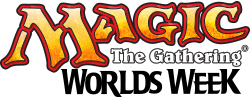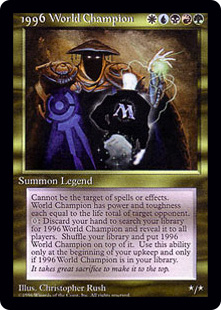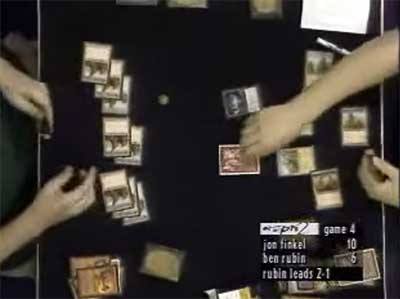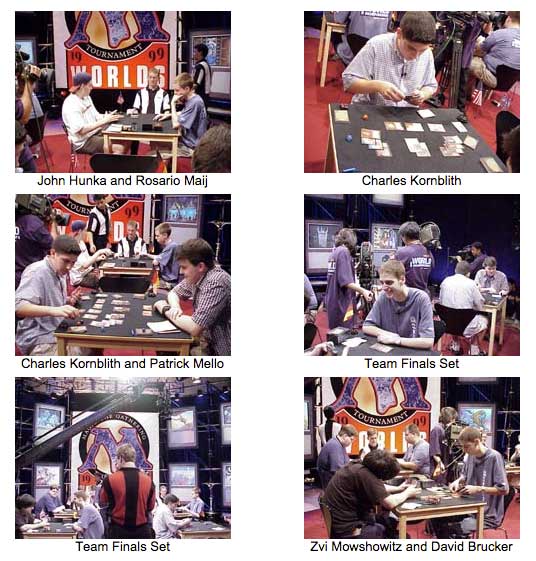All The Worlds a Stage
Welcome to Worlds Week. This week is the 21st Magic: The Gathering World Championships, which is being held in Nice, France (you can watch live here). Originally, I thought it might be fun to walk you through all the Worlds (as I have had the pleasure of attending all but one) but I realized I did that back in 2009. Upon further inspection, I realized I have also written an entire article about the first Worlds in 1994 and the second Worlds in 1995. I even once wrote an article filled with Worlds trivia. For today, I thought it would be fun to focus on a different aspect of Worlds.

You see, for years I went to every Pro Tour. My job back in the day was to oversee the Feature Match area, choosing the matches and then judging them. On Sunday, though, I was the video producer in charge of overseeing the video component of the finals. I chose the commentators and interacted with the director to choose which match we showed when. For today, I'm going to start with the Worlds where I first served as video producer—1996. I will then tell a tale from each of the following three World Championships. This will give you a chance to see a different side of the Magic: The Gathering World Championship.
Worlds 1996—The Instant Playback
The 1996 World Championship was unique in that it was held in Renton, Washington, at the Wizards of the Coast corporate offices. I don't mean nearby or in a hotel down the street. The event was literally held in our building. Everyone in the company stopped what they were doing and, for a week, we all focused on the World Championship.
This was the first Worlds that was also a Pro Tour and it was early enough that I was still doing commentary. That's right, in the early days I served as the play-by-play announcer and I would pull in different pro players to serve as color commentators. The first Pro Tour was a mess (I did an entire podcast on it if you want to hear the gory details). The second Pro Tour in Los Angeles was the first where I worked with a pro player commentator. It was Mark Justice and the only soundproof booth the technical crew could find for us aboard the Queen Mary was in a phone booth. It was a somewhat large phone booth, but Justice and I spent twelve hours in it, as the Top 8 went long. We came very, very close to ordering a pizza delivery on-air. (We were quite hungry.) Shawn "Hammer" Regnier defeated Tom Guevin, both from the US. "Hammer" then did the commentary with me at the next Pro Tour, Pro Tour Columbus, where newcomer Olle Råde from Sweden defeated Sean Fleischman of the United States.
The next Pro Tour after that was 1996 World Championships in lovely Renton, Washington. For that event, I asked pro player Mark Chalice to act as color commentator. Mark Chalice is probably not that well known historically. He only had one Top 8, although many Top 16 finishes. Chalice was well known for tearing up the Swiss rounds only to lose right before he made Top 8. In fact, at 1996 Worlds, he came in 11th. Chalice was also one of the sixteen competitors at the first Duelist Invitational in Hong Kong.
The reason I asked Chalice to commentate with me was three-fold. One, he was a very good player and I thought he would have a lot of interesting things to say. Two, he was a friend of mine from back when in I lived in Los Angles, and we had a good rapport together. Three, he was also good friends with Mark Justice, who was one of the finalists, and I knew he would have a lot of insight into what Justice had done to prepare for the tournament.
Mark Justice, for those who might not know, was the first real big name in professional Magic. Back in 1995, he came in 2nd in the Southwest Region (in 1995, each region had its own tournament and the highest finishers got invited to US Nationals. Justice would then go on to defeat Henry Stern to become the US National Champion. Then, at Worlds, Justice came in 3rd and was on the winning national team (the US team of Justice, Stern, Mike Long, and Peter Lieher were the first winners of the World Team Championship —I talked all about it in the article I linked to above).

Mark Justice (Right) playing against Blumke (Left) at the 1995 World Championship
Justice then went on to make Top 8 of the first Pro Tour. At the time, if you polled random Magic players and asked them who the best Magic player in the world was, most of them would have named Mark Justice. And 1996 Worlds only reinforced this belief, as Mark Justice ended up playing in the finals. His opponent was Tom Chanpheng from Australia. That Worlds was Chanpheng's first Pro Tour and he was a total unknown. Going into the finals, everyone assumed that Justice, the "best player in the world," was about to be crowned the Magic World Champion.
The way the setup worked back then was the tournament was on the first floor, in the lobby, and Chalice and I were on the second floor in a back room. We watched the gameplay through the cameras being used to broadcast it to the audience in a third room. I'd love to say that Chalice and I were amazing but that wasn't the case. While I was knowledgeable about the Pro Tour, my ability to quickly recap everything that was happening was poor. As you'll see next year, my reign as play-by-play announcer was a short one.
The biggest mistake we made was during the second game. While Justice was clearly the better-known player, Chanpheng had the deck advantage. Justice was playing a mono-black Necrodeck (i.e., a deck built around the Ice Age card Necropotence) while Chanpheng was playing a White Weenie deck designed to beat Necrodecks.
Other than a dead card due to a decklist error, Chanpheng had the advantage, deck-wise. Justice lost the first game. In the middle of the second game, Chalice swore the judges had called something incorrectly. He was so sure that he had us stop the game so we could go back and watch the tape. There are not a lot of moments in Pro Tour history where the game was halted so the tape of the game could be rewound and watched, and this might even have been the only one. So after about half an hour of the judges checking the tape, it turned out Chalice was…wrong. I got a lot of dirty stares and everyone left to restart the finals.
For those unaware of the story of the 1996 Worlds finals, the key play was a double Demonic Consultation cast by Justice that went awry. Justice never recovered from it and went on to lose to Chanpheng. The Australian was awarded a trophy with a one-of-a-kind card embedded in it (no really, we printed it on one sheet and then showed a video of us destroying every other copy of the card).

Meanwhile, in the team event, young up-and-comers Team Czech Republic almost had an upset, but the US Team managed to win for the second year in a row.
The event went well, even if the video coverage (which was only for the people in the building, as there wasn't anywhere to show the video yet and streaming was almost two decades away) wasn't exactly the best it could have been.
Worlds 1997—Start of the Show
For the third year in a row, the World Championships was held in Seattle, but this time to bring some focus to our new chain of game stores, we held the 1997 World Championships at the Wizards of the Coast flagship store in the University District of Seattle (the "university" in question is the University of Washington, known by locals as "U Dub").
Meanwhile, we were trying to give the Pro Tour a higher profile, so Wizards struck a deal with ESPN2 to start producing Magic shows. Each was half an hour and focused on a different Pro Tour. First up was the 1997 World Championships. This meant my video producer role added a lot more to my plate. For starters, before the event even began I had to compile a list of top pros we needed to do pre-interviews with. The goal was to get a few people from Top 8 on camera at the beginning of the tournament. Obviously, as we didn't know who the players in the Top 8 were going to be, I had to make a lot of educated guesses.
One person I chose to interview was a young player from the Czech Republic named Jakub Slemr. He had done well the previous Worlds in the team event but hadn't yet managed to make a top finish as an individual. I was asked why I put him on the schedule to interview and all I could say was I just had a hunch he was going to do well. And he did. Jakub would go on to become the 1997 World Champion and we had an interview with him before the event.

Jakub Slemr, 1997 World Champion
For those who love obscure Pro Tour trivia, the host of that 1997 Worlds show was none other than future Survivor host, Jeff Probst. The finals was shot in the basement of the Wizards of the Coast Tournament Center, and it was not really big enough. The jib, the camera on a lever that could be raised to show the table from above, had very little room to move. And because it wasn't well ventilated, all the lights made the basement very hot.
In the year since the previous Worlds, it was clear that I wasn't cut out for commentating. I experimented with various hosts and the two commentators for the 1997 Worlds was an odd pair. The play-by-play was still done by a Magic designer, just not me. For this one event it was done by Mike Elliott (known as the man who is #2 overall in Magic lead designs). For color commentary I used a man named Jeff Donais. Donais would go on to work for Wizards and would even run the Pro Tour for a number of years. At the time, he was a player (and tournament organizer) and actually played in 1997 Worlds. In fact, I almost lost him because he made a run for the Top 8. Jeff went undefeated Day One and did well Day Two. All he needed was to go 2–4–1 on Day Three and he was a lock for Top 8. Donais fizzled out, though, and only went 1–5–1.
The other funny story was the decision that the American team needed some spiffing up. Many national teams had come with team uniforms, which visually looked stunning on camera. The US team did not and looked rather unimpressive. Now remember, this was the third year that a team event was held at Worlds and the previous two years the US team took the title. We sent people running all over Seattle looking for American flag shirts, which we finally found. The US team would crash and burn and never make it anywhere near the finals. In the end, Team Canada took home the title, keeping it in North America, by defeating Team Sweden. The Canadian team included Jeff Donais's brother Mike Donais, who would later go on to work in R&D.
Jakub Slemr defeated Janusch Kuhn from Germany in the finals. Paul McCabe from Canada came in 3rd, which made him the second Pro Player of the Year. Our coverage was significantly better in 1997 than 1996, mostly because of all the extra resources that came along with doing an ESPN2 show. Jeff Donais proved to be a good commentator, but I later lost him when he started working at Wizards and began serving as the tournament manager for the Pro Tour.
Worlds 1998—Two Ceremonies
The 1998 World Championships was also held in Seattle, but instead of at the Wizards of the Coast tournament center, it was held a few blocks away at the University of Washington. That season had been a dominant one by the United States, which had won every Pro Tour of the year. The big question was if the US could sweep the Pro Tour season by winning the final event—the 1998 Magic World Championships.
Just as with 1997, the 1998 Worlds was going to be broadcast on a show on ESPN2. As the video producer of the Pro Tour, that meant I was once again very busy. One of my responsibilities was selecting the commentators for the Top 8. After a lot of trial and error, I found what I felt was the perfect mix: Brian Weissman doing play-by-play and Chris Pikula doing color commentary. Brian Weissman is best known historically as the creator of "The Deck," the first Magic deck to gain renown and go public. I remember back when I lived in Los Angeles in my pre-Wizards days, traveling up to San Francisco for a tournament and bringing Moats to trade. The reason was they went into The Deck, and it had just begun its climb to fame, starting with Weissman's hometown at the time. Weissman and I became friends and I was always fascinated by his take on the game.

A peek at the ESPN2 coverage, back in the early days
I had gotten to know Chris through the Pro Tour. Besides being an excellent player, Chris was an amazing storyteller who could make any event into a memorable romp. Chris was very funny and personable. When I was trying to find commentators, both Weissman and Pikula came to mind. I tried each of them out and they excelled at the task. I put them together and it was perfection. For much of our ESPN2 time, they were my go-to commentators.
This story has another wrinkle. The 1998 Worlds took place from Wednesday, August 12, through Sunday, August 16, in Seattle, Washington. On Saturday, August 15, my only sibling, my sister Alysse, got married. In Cleveland, Ohio. My family has always been very close, so there was no way I was missing my sister's wedding. But I also had to make sure we had the coverage we needed from the finals for the ESPN2 show. Here's how I did both.
I went to Worlds for Wednesday and Thursday. My wife Lora and I then hopped on a plane Friday morning, arriving in Cleveland in time for the rehearsal dinner Friday night. On Saturday, I did various wedding-related activities, attending the wedding that night (including being an usher) and the party afterwards. Lora and I then left on the earliest flight out of town Sunday morning, managing with the help of the time zone change to arrive back in Seattle by 10:00 am. I arrived in the commentator booth during the quarterfinals.
In order to make this all work, I did a lot of prep work setting everything up. Weissman and Pikula were on call to be the commentators, but I had scheduled a back-up in case one of the two of them managed to make Top 8. I learned shortly after arriving in Cleveland on Friday that Pikula had done exactly that. My back-up was a man named Randy Buehler. Buehler and I had also become friends on the Pro Tour. I would later recommend him for a job in R&D. Buehler thrived and eventually became my boss. Much like Weissman, I liked how Randy talked about the game and thought he had a chance of being a good commentator.
Moments after I arrived back in the booth, I managed to watch Pikula lose his quarterfinal match. It was then that I made a peculiar call. The ESPN2 show was only half an hour long. Barring a super-fast match (as Worlds 1999 would turn out—I'll get to that in a minute), usually we only had time to show the finals. That meant that I had the opportunity to swap Pikula in. Buehler had been doing a fine job (and would later, of course, get a lot more opportunities) but I really felt Weissman and Pikula were my best pair, so I asked Pikula if he was up to doing commentary on the semis and finals. Pikula was and became the first, and I believe only, person to ever do Pro Tour coverage on a Top 8 he had competed in. Pikula aced it and the ESPN2 coverage turned out great.
By the way, Brain Seldon defeated Ben Rubin in the finals to become the 1998 Magic World Champion. Seldon and Rubin were Americans, allowing US the only Pro Tour season sweep thus far. The US team also took the team finals, defeating Team France.
Worlds 1999—Fast Play
The 1999 Magic World Championships was held in Yokohama, Japan. Yokohama, for those unaware, is a city near Tokyo. Yokohama is one of a few cities to host two multiple World Championships (the other one was held in 2005). The 1999 Worlds is famous for many things, but probably the most important is it was the first Pro Tour to be won by Kai Budde.
For those who don't know your Pro Tour history, Kai Budde is a pro player from Germany who holds the distinctions of having won the most Pro Tours, with seven victories. Kai is also one of only two players to have won a World Championship, a World Team Championship, another Pro Tour, and a Magic Invitational. (The one other person to accomplish this feat is Jon Finkel.) Kai Budde is in the Magic Pro Tour Hall of Fame, having been voted in almost unanimously. But at the time of 1999 Worlds, Kai was not yet a known commodity. That's not to say Kai was unknown. That year, he had managed to win three back-to-back European Grand Prix, along with a 2nd-place finish. But on the bigger Pro Tour stage, he was a still mostly a new face.

Kai Budde
Worlds was still being shown on ESPN2, so I had lined up my commentators and flew them to Japan. Neither Weissman nor Pikula were playing at Worlds, so unlike the previous year there was no fear of a last-minute swap. Pikula had to work, though, so he flew in at the last minute on a red-eye and was exhausted.
The final day did a good job of playing the narrative of the season. The United States was continuing to do well, but there was a new up-and-coming country that was starting to make a name for itself—Germany. Both the individuals and the team event came down to an American competitor/team and a German one.
The team finals was up first. Team United States consisted of team captain and US national champ Kyle Rose, with John Hunka, Zvi Mowshowitz, and Charles Kornblith. Team Germany consisted of team captain and German national champ Marco Blume, with Rosario Maij, David Brucker, and Patrick Mello. Both teams had numerous top pro players. Future Hall of Famer Zvi Mowshowitz was the best known of the Americans, while Patrick Mello was probably the best known of the Germans. Marco Blume would later become famous for teaming up with Kai Budde and Dirk Baberowski to make the team Phoenix Foundation, which would win two team Pro Tours, making Marco Blume one of a small handful of pro players to have won two or more Pro Tours.

The Germans looked better on paper, but the Americans had only lost the Worlds team event one time (back in 1997) since the team event had started. In the end, the Americans pulled it out. Sadly for Marco Blume, the most memorable play of the whole finals was Marco Blume playing his Covetous Dragon with no artifacts on the battlefield, forcing him to sacrifice it. (In his defense, by the time the deck could play Covetous Dragon there were always artifacts in play—well, almost always.) That one unfortunate play aside, the German team played well but not quite as well as the Americans.
Behind the scenes, we had decided to have one ESPN2 show about the team event and one about the individual finals. When the individual finals came down to American Mark LePine versus German Kai Budde, there was some worry as neither player was particularly well known. LePine had previous success at Pro Tours, but this was Budde's first Pro Tour Top 8. Having seen Budde play a little at Grand Prix Barcelona (the Invitational had been held there) and knowing of his Grand Prix record, I assured everyone that Kai was more than worthy of the world champion title.
Both players were playing mono-red decks. LePine's leaned more toward land destruction while Kai was playing a red artifact deck (the same one Marco Blume was playing in the team event). Both decks were exceptionally fast. The first game lasted less than four minutes. The second game took less than three. Both went to Budde. I remember walking to the stage before the third game. "You guys can take your time," I said, "There's no reason to rush."
I said this because we had a half hour show to fill and the first two games took a combined seven minutes. The final game took Budde five minutes to win. That means the total of the entire final match was twelve minutes. Showing every minute, including some pregame chatter, the finals did not have enough material to fill the show. We ended up having to run some semifinals footage to fill up the half hour.
The US and Germany ended up splitting the two big events, but Germany had clearly staked its claim as a country to be watched. Over the next few years, Germany, and Budde specifically, would become dominant in a way never seen before.
All Over the Worlds
We're out of time, so future stories of Worlds will have to wait for other Worlds theme weeks. I hope you enjoyed today's tales and am very interested in your feedback. You can email me or contact me through any of my social media (Twitter, Tumblr, Google+, Instagram).
Join me next week when I check my mail.
Until then, may your Magic games be just as memorable.
"Drive to Work #178—Tribal"
This podcast is all about the card type tribal—how it came about, how we used it, and why we finally decided to never use it again.
"Drive to Work #179—Banding"
This podcast is all about the creature keyword from Alpha that we stopped doing for complexity reasons. Today I talk about it and explain its fate.
- Episode 179 : Banding (16.7 MB)
- Episode 178 : Tribal (13.7 MB)
- Episode 177 : 10 Things Every Game Needs: Goal (16.0 MB)
- Episode 176 : Tales from Europe (23.5 MB)
- Episode 175 : Exploratory Design (19.5 MB)
- Complete Drive To Work Podcast Archive


